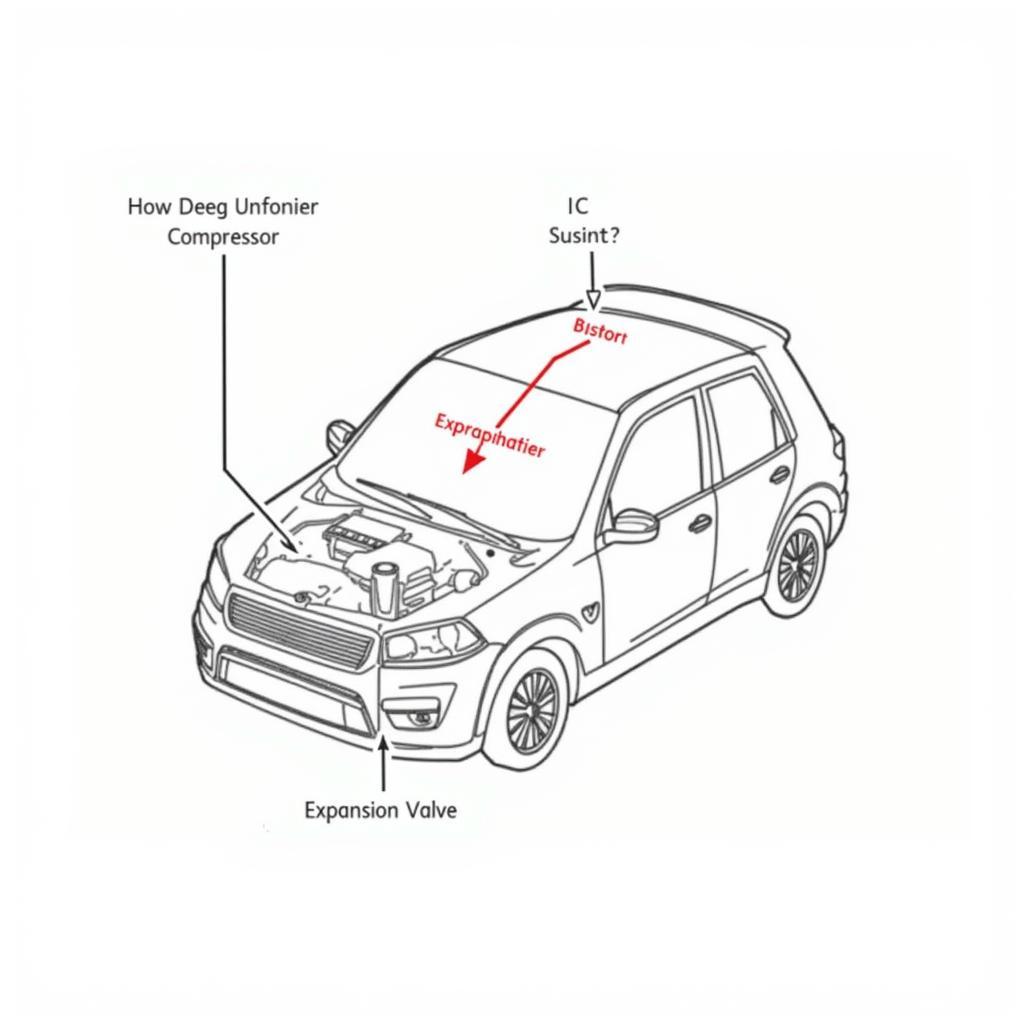Keeping your car cool during scorching summers is crucial, and a malfunctioning AC can make driving unbearable. This guide provides a detailed walkthrough on how to fix your car’s AC, covering common issues and their solutions. We’ll equip you with the knowledge to diagnose the problem and decide whether to tackle it yourself or seek professional help. Places that fix AC for cars are also an option if you prefer expert assistance.
Identifying the Problem: Where to Start When Your Car AC Isn’t Working
Before diving into repairs, accurate diagnosis is key. Is the air blowing weakly? Is it warm instead of cold? Or is there no air at all? Each scenario points to different potential culprits. A simple check might reveal a blown fuse, while a complete lack of cold air might indicate a refrigerant leak.
A common issue is low refrigerant. You can check this yourself using a pressure gauge, available at most auto parts stores. However, handling refrigerant requires caution due to its environmental impact and potential health risks.
Another potential problem is a faulty compressor, the heart of your AC system. Listening for unusual noises when the AC is on can indicate compressor issues. A clicking sound could be a failing clutch, while a grinding noise often signifies internal damage.
If you’re unsure, car places that fix AC have the specialized tools and expertise to pinpoint the exact problem.
Simple Fixes You Can Do Yourself
Some AC problems have straightforward solutions you can tackle at home. Start by checking the fuses. Locate your car’s fuse box (usually under the dashboard or hood) and consult your owner’s manual to identify the AC fuse. A blown fuse is easily replaced and can restore your AC functionality in minutes.
Next, inspect the cabin air filter. A clogged filter restricts airflow, reducing the effectiveness of your AC. Replacing it is a simple DIY task and can significantly improve airflow.
Inspect the drive belt that powers the AC compressor. If it’s loose, worn, or broken, your AC won’t function correctly. Replacing a drive belt is relatively easy but might require specific tools.
When to Seek Professional Help
While some fixes are DIY-friendly, others require professional expertise. If you suspect a refrigerant leak, where to fix AC in car near me can help you find local experts. Refrigerant leaks must be addressed by certified technicians with specialized equipment. They can identify the leak, repair it, and recharge the system with the correct amount of refrigerant.
Understanding Your Car’s AC System
Your car’s AC system comprises several key components, each playing a vital role in cooling the cabin. The compressor compresses the refrigerant, raising its temperature and pressure. The refrigerant then travels to the condenser, where it releases heat and condenses into a liquid. This liquid refrigerant passes through an expansion valve, causing a pressure drop and cooling effect. Finally, the cold refrigerant flows through the evaporator, absorbing heat from the cabin air and blowing cool air into your car.
 Diagram of a Car’s AC System
Diagram of a Car’s AC System
“A properly functioning AC system relies on the seamless interaction of these components,” says John Miller, a certified automotive technician with over 20 years of experience. “Regular maintenance, including checking refrigerant levels and replacing the cabin air filter, can prevent many AC problems.”
How Much Does it Cost to Fix a Car AC?
The cost of fixing an AC in car varies depending on the problem. A simple fuse replacement is inexpensive, while a compressor replacement can be significantly more costly. Factors like your car’s make and model, labor rates, and the availability of parts also influence the final price. Getting multiple quotes from reputable repair shops is recommended before deciding.
Maintaining Your Car’s AC System
Regular maintenance can extend the life of your AC system and prevent costly repairs. Checking refrigerant levels annually and replacing the cabin air filter regularly are crucial. Additionally, running the AC for a few minutes each month, even during winter, helps lubricate the system and prevents seals from drying out.
 Recharging Car AC with Refrigerant
Recharging Car AC with Refrigerant
“Preventive maintenance is the best way to avoid major AC problems,” advises Sarah Johnson, an automotive engineer specializing in climate control systems. “Simple steps like regular checks and timely repairs can save you money and keep your car cool for years to come.”
Conclusion
Fixing your car’s AC can range from simple DIY tasks to complex repairs requiring professional help. This guide has provided you with the information to diagnose common problems and decide on the best course of action. Remember, regular maintenance is key to a well-functioning AC system. If you need further assistance or want expert advice, feel free to contact us at AutoTipPro. Our phone number is +1 (641) 206-8880 and our office is located at 500 N St Mary’s St, San Antonio, TX 78205, United States. We’re here to help you stay cool on the road!
FAQs
-
How often should I recharge my car’s AC? While a well-maintained system shouldn’t require frequent recharging, it’s good practice to have it checked annually.
-
Why is my car AC blowing hot air? This could be due to low refrigerant, a faulty compressor, or a blocked expansion valve.
-
How can I tell if my car AC compressor is bad? Unusual noises like clicking or grinding, warm air blowing from the vents, or no air at all can indicate a failing compressor.
-
Can I fix a refrigerant leak myself? No, refrigerant leaks require professional repair by certified technicians with specialized equipment. If you are in Nacogdoches, Texas, you can find who fixes car AC in Nacogdoches.
-
How can I improve my car’s AC efficiency? Regular maintenance, including checking refrigerant levels, replacing the cabin air filter, and ensuring proper airflow, can improve AC efficiency.
-
What’s the difference between a condenser and an evaporator? The condenser releases heat from the refrigerant, while the evaporator absorbs heat from the cabin air.
-
Is it bad to run the AC on full blast all the time? While it won’t necessarily damage your AC, running it at full blast constantly consumes more fuel.





Leave a Reply